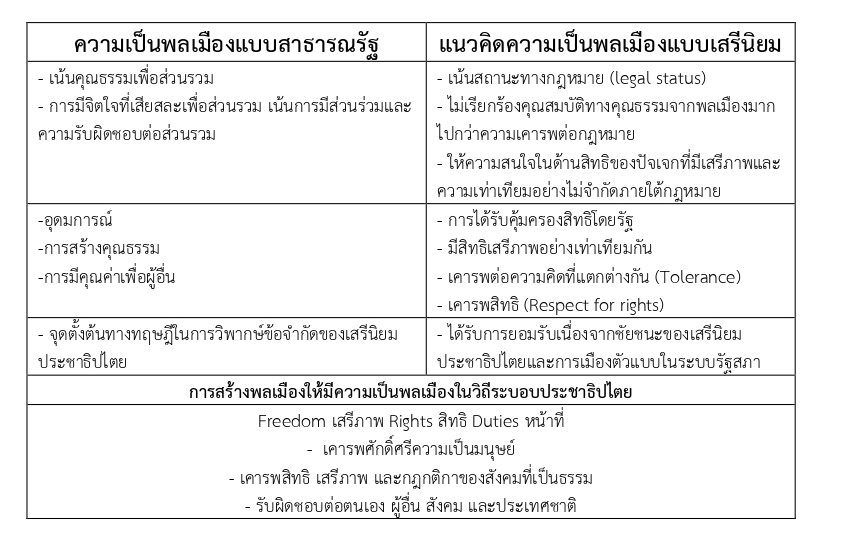สาธารณรัฐนิยมพลเมืองกับการเป็นสากลพลเมือง
คำสำคัญ:
สาธารณรัฐนิยมพลเมือง, พลเมือง, สากลพลเมืองบทคัดย่อ
บทความวิชาการนี้ มีวัตถุประสงค์เพื่อศึกษา สาธารณรัฐนิยมพลเมืองกับการเป็นสากลพลเมือง โดยการรวบรวมข้อมูลจากเอกสารวิชาการ บทความ ตำรา ที่เกี่ยวเนื่องกับประเด็นความเป็นพลเมือง รวมทั้งสื่ออิเล็กทรอนิกส์ที่เกี่ยวข้อง และใช้แนวคิด ทฤษฎี มาวิเคราะห์ พบว่า แนวคิดสาธารณรัฐนิยมพลเมืองมักถูกนำมาใช้เป็นจุดตั้งต้นทางทฤษฎีในการวิพากษ์ข้อจำกัดของเสรีนิยมประชาธิปไตยในฐานะอุดมการณ์ทางการเมือง และได้รับความนิยมน้อยกว่าเสรีนิยม เนื่องจากชัยชนะของเสรีนิยมประชาธิปไตย และการเมืองในระบบรัฐสภา แต่แนวคิดความเป็นพลเมืองแบบสาธารณรัฐนิยมก็มีส่วนสำคัญที่ทำให้เกิดการพัฒนาทางการเมือง ตลอดจนเป็นการคานกันหรือถ่วงดุลรูปแบบแนวคิดต่าง ๆ ที่เอื้ออำนวยต่อการปกครองประชาธิปไตยให้มีเสถียรภาพได้ สถานะของความเป็นพลเมืองในหลาย ๆ แนวคิดอาจเหมาะสมกับพลเมืองในสังคมหนึ่งหรือในบริบทของสังคมนั้น ๆ ที่แตกต่างกัน อาจกำหนดลักษณะของพลเมืองที่สังคมต้องการต่างกัน ทำให้ความน่าสนใจของความคิดแบบสาธารณรัฐนิยมอยู่ที่การมุ่งเน้นที่ว่า “พลเมือง” ต้องเน้นประโยชน์ส่วนรวมเป็นหลัก ต้องเอาประโยชน์เฉพาะส่วนเฉพาะกลุ่มเป็นรองประโยชน์ส่วนรวม
เอกสารอ้างอิง
ณัชชาภัทร อุ่นตรงจิตร. (2554). รัฐศาสตร์. กรุงเทพฯ: สำนักพิมพ์จุฬาลงกรณ์มหาวิทยาลัย.
พลอยใจ ปิ่นตบแต่ง. (2566). รัฐธรรมนูญนิยมและความเป็นพลเมืองไทยในฐานะส่วนหนึ่งของประวัติศาสตร์ภูมิปัญญาสาธารณรัฐนิยมสมัยใหม่สากล (ค.ศ. 1885–1932).วารสารสังคมศาสตร์ จุฬาลงกรณ์มหาวิทยาลัย, 53(2), 236-59.
วิทยากร เชียงกูล. (2550). อธิบายศัพท์สังคมศาสตร์เพื่อการพัฒนา. กรุงเทพฯ: สายธาร.
สำนักงานเลขาธิการสภาผู้แทนราษฎร. (2558). ความเป็นพลเมืองในระบอบประชาธิปไตย. กรุงเทพฯ: สำนักการพิมพ์ สำนักงานเลขาธิการสภาผู้แทนราษฎร.
สุเทพ คำเมฆ และ พรอัมรินทร์ พรหมเกิด. (2565). การศึกษาความเป็นพลเมืองผ่านมุมมองทางสังคมวิทยาการเมือง. วารสารจันทรเกษมสาร, 28(1), 78-92.
Ahmad, F. et al. (2012). Social citizenship: Rights, participation, and responsibilities of young people. Asian Social Science, 8(5), 132.
Almond, G. A. & Verba, S, eds. (1980). The civic Culture Revisited. London: SAGE.
Cornwall, A. & Coelho, V. S. (2006). Space for Change? Representation, Inclusion and Voice in New Democratic Arenas. London: Zed books.
Delanty, G. (2002). Two conceptions of cultural citizenship: A review of recent literature on culture and citizenship. The global review of ethnopolitics, 1(3), 60-66.
Dewey, J. (1975). Moral Principles in Education. London: Fever and Simons.
Drucker, F. P. (1993). Post-Capitalist Society. Oxford: Butterworth-Heinmann.
Faulks, K. (2000). Citizenship. New York: Routledge.
Gunew, S. (2004). Haunted nations: The colonial dimensions of multiculturalism. London & New York: Routledge.
Heywood, A. (2007). Politics. (Third Edition). New York: PALGRAVE MACMILLAN.
Marshall, T.H. (1950). Citizenship and Social Class. Cambridge: Cambridge University Press.
Procacci, G. (2004). Governmentality and Citizenship. In Kate Nash and Alan Scott (Eds.), The Blackwell companion to political sociology, State University of Milan (Italy), (pp.342-351). Milan: Blackwell Publishing Ltd.
Turner, B. S. (1990). Outline of a Theory of Citizenship. Sociology, 24(2), 189-217.
UNESCO. (2024). Global citizenship and peace education. Retrieved February 5, 2024, from https://www.unesco.org/en/global-citizenship-peace-education.
Wieling, H. J. (1974). AN Sherwin-White, The Roman Citizenship, 2. Aufl. Zeitschrift der Savigny-Stiftung für Rechtsgeschichte: Romanistische Abteilung, 91(1), 414-418.

ดาวน์โหลด
เผยแพร่แล้ว
รูปแบบการอ้างอิง
ฉบับ
ประเภทบทความ
หมวดหมู่
สัญญาอนุญาต
ลิขสิทธิ์ (c) 2024 วารสารวิชาการรัฐศาสตร์และรัฐประศาสนศาสตร์

อนุญาตภายใต้เงื่อนไข Creative Commons Attribution-NonCommercial-NoDerivatives 4.0 International License.




